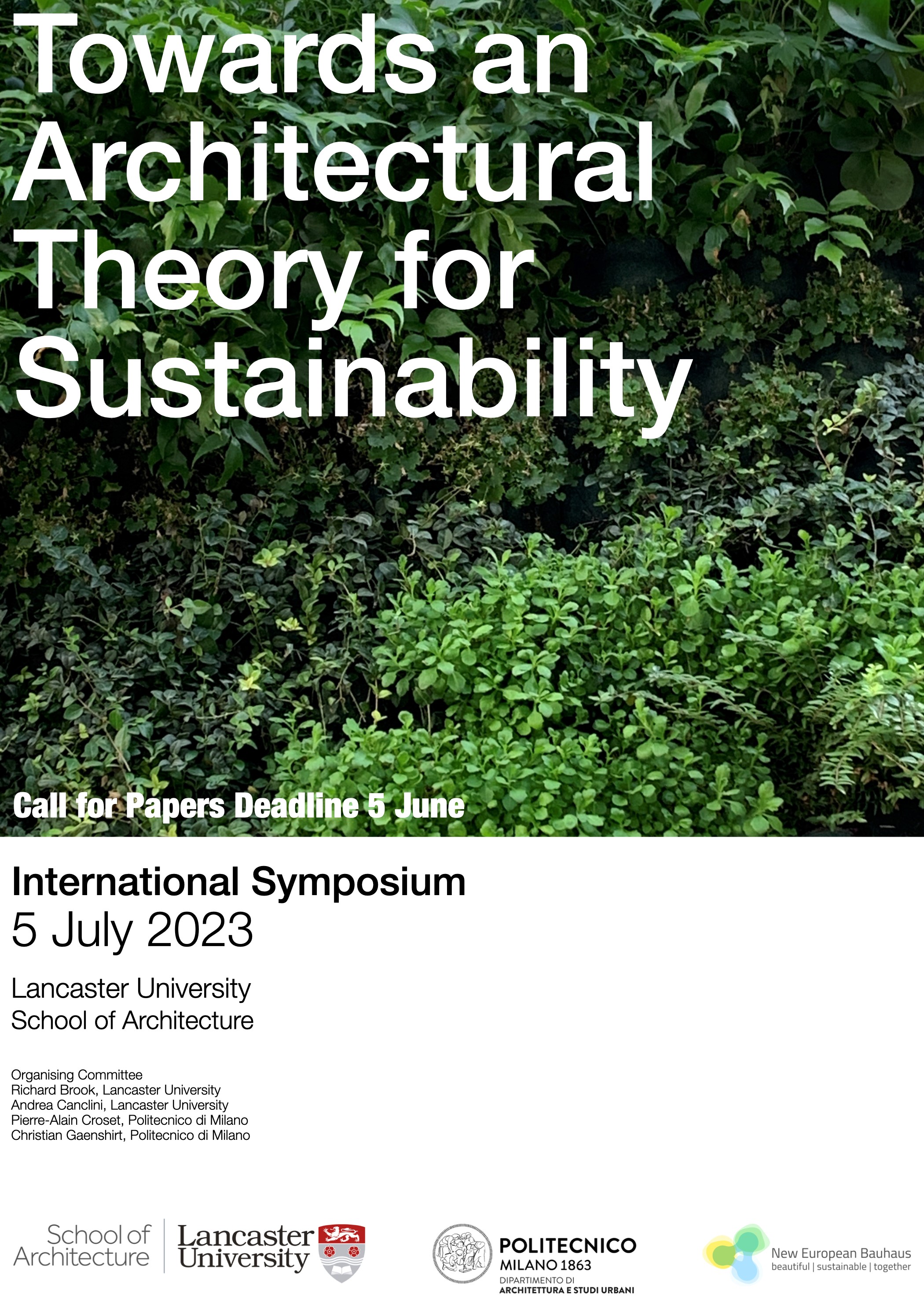Towards an Architectural Theory for Sustainability
Wednesday 5 July 2023, 9:00am to Friday 7 July 2023, 5:00pm
Venue
Lancaster Institute for the Contemporary Arts (LICA), Lancaster, Untied Kingdom, LA1 4YE - View MapOpen to
Postgraduates, StaffRegistration
Free to attend - registration requiredRegistration Info
Register for this event here: https://www.eventbrite.co.uk/e/towards-an-architectural-theory-for-sustainability-tickets-644508641697
Please e-mail your title and abstract (500 words max.) to christian.gaenshirt@polimi.it and a.canclini@lancaster.ac.uk by t
Event Details
Call for Papers: Towards an Architectural Theory for Sustainability International Symposium at Lancaster University School of Architecture, in cooperation with DAStU, the Department of Architecture and Urban Studies, Politecnico di Milano
With the increasingly visible consequences of local and global climate change, with the threat of resource depletion, increasing air, land and water pollution, and ongoing ecological damage, sustainability has become of paramount importance to the architectural disciplines. The multifaceted issues of sustainability require a rethinking of the built environment as a key tool for creating metabolic ecological, economic and social systems, and a deep understanding of how these systems work and what their effects are at individual, large, and global scales, and in the long term. It is also necessary to define an acceptable balance between the privatised gains and the externalised negative effects of all these metabolisms. How can the disciplines of architectural theory, history and criticism contribute to these goals? What does this necessary, broad and interdisciplinary debate consist of?
Despite the fact that architects have often overestimated themselves, their role in environmental issues seems to have received little professional recognition over the last decades. In recent years, however, thanks to a large number of campaigns, initiatives, commitments and goals by a much larger segment of architects and their institutional bodies, the great freeze in mainstream architecture's attitude to the environment has reached a tipping point towards greater involvement. If this is the case, why has the discipline taken so long to engage in this necessary, broad and interdisciplinary debate? Why has mainstream architecture culturally lagged behind environmental concerns for the past 50 years?
Today, some argue that architecture should move towards a materiality-based view, in order to increase its effectiveness in the field of sustainability; but we can also ask ourselves about the role and importance of theory and criticism in pursuing and achieving this. This is urgently needed before we find ourselves in a quaint throwback to the past, with engineering and the sciences assuming the role of those called upon to find solutions to problems that are too pressing for a profession unprepared to meet these challenges with its own disciplinary content.
How has the concept of sustainability in architecture itself evolved, given that individual aspects of sustainability such as the social, ecological or economic dimension have been addressed by authors such as John Ruskin, Ebenezer Howard, Adolf Loos, Le Corbusier, Richard Buckminster Fuller, Lewis Mumford, Christopher Alexander, Bernard Rudofsky, Reyner Banham, Jane Jacobs and many others, up to the recent concept of the Anthropocene?
Most importantly, what are the key concepts and performance criteria that provide the cognitive basis and critical framework needed for future research and professional application? How theories of sustainability help to centre a creative critical context for the development of design methodologies and architectural practice is crucial for teaching and practice. While many take sustainable design for granted, others see environmental performance as a mere outcome of the digital revolution and a techno-centric domain. Some argue that the profession should move towards a materiality-based self-image to increase its effectiveness in sustainability; others question the role and importance of theory, history and critique in pursuing and achieving this.
Thanks to campaigns and initiatives by some architects and their institutional bodies, architecture's attitude to the environment has reached a definitive point of co-involvement - a practice that incorporates the competences of other disciplines. Innovative and committed architects are exploring new ways of practice and education as a contribution to the reformulation of the discipline before the profession risks obsolescence - other disciplines such as engineering and the sciences are already leading the way in finding solutions to these pressing problems - architecture must be able to meet these challenges with its own disciplinary discourses. The lack of a theoretical framework that is well connected to established architectural and urban theory needs to be addressed.
We will therefore ask questions such as:
- What does this necessary, broad and interdisciplinary debate mean for architectural theory, history and criticism?
- What are the key concepts and performance criteria that provide the cognitive basis and critical framework needed for research and professional application?
- How do we theoretically frame environmental concerns in order to organise our professional activity?
- How has the concept of sustainability in architecture evolved from its beginnings to the Anthropocene?
- To what extent does architectural education need to rethink how and what it teaches in the coming years?
Further goals are also to create an international research network on these topics, and a book proposal to a publisher for an edited volume.
Invited Speakers
Jörg Gleiter, TU Berlin
Lutz Robbers, HS Oldenburg
Andrea Alberto Dutto, RWTH Aachen
Pedro Gadanho, Universidade da Beira Interior
Organising Committee
Richard Brook, Lancaster University
Andrea Canclini, Lancaster University
Pierre-Alain Croset, Politecnico di Milano
Christian Gaenshirt, Politecnico di Milano
Editorial Team (book proposal)
Richard Brook, Lancaster University
Andrea Canclini, Lancaster University
Christian Gaenshirt, Politecnico di Milano
Francesca Zanotto, Politecnico di Milano
Schedule
Call for Papers 25 May
Abstract submission 5 June
Shortlisting 10 June
Draft papers or slides 30 June
Symposium 5 July
Final papers 31 July
Please e-mail your title and abstract (500 words max.) until the evening of June 5th to christian.gaenshirt@polimi.it and a.canclini@lancaster.ac.uk
Please indicate if you can’t attend the symposium and would only like to propose a paper for the book
Gallery
Contact Details
| Name | Andrea Canclini |

.svg)
